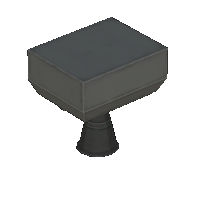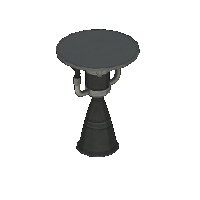Difference between revisions of "LV-1 "Ant" Liquid Fuel Engine"
From Kerbal Space Program Wiki
m (*update to new PartBox;) |
Anaxagoras (talk | contribs) m (rem redundant word) |
||
| (24 intermediate revisions by 18 users not shown) | |||
| Line 1: | Line 1: | ||
| − | {{ | + | {{:LV-1 Liquid Fuel Engine/Box}} |
| − | + | ||
| − | + | The '''LV-1 "Ant" Liquid Fuel Engine''' is the smallest [[liquid fuel engine]] available. | |
| − | + | ||
| − | + | == Product description == | |
| − | + | {{Quote | |
| − | | | + | |What is this, an engine for ants? |
| − | | | + | |manufacturer=JKJSP}} |
| − | + | ||
| − | + | == Usage == | |
| − | + | Although the Ant has extremely poor specific impulse in atmosphere, it provides decent specific impulse in vacuum. In combination with its low mass and tiny size, this makes it a good choice for small satellites. | |
| − | |||
| − | |||
| − | |||
| − | The | + | The radially-mounted [[LV-1R "Spider" Liquid Fuel Engine|LV-1R "Spider"]] has a similar design, the same weight, and the same vacuum thrust. The Spider adds atmospheric performance and thrust vectoring at the cost of vacuum efficiency. |
| − | + | == Variants == | |
| + | As of {{version|1.7}} this engine has two models that can be switched in the editor. | ||
| − | == | + | {{multiple image |
| − | + | |align=left | |
| − | | | + | |width=200 |
| − | + | |image1=LV-1_Shroud.png | |
| + | |alt1=Shroud variant | ||
| + | |image2=LV-1_Bare.png | ||
| + | |alt2=Bare variant | ||
| + | |footer=The different variants of the engine | ||
| + | }} | ||
| + | {{clear|left}} | ||
== Trivia == | == Trivia == | ||
| − | The | + | * The product description is a reference to the movie ''[[w:Zoolander|Zoolander]]''. |
== Changes == | == Changes == | ||
| − | ; | + | ;[[1.7]] |
| − | * Initial | + | * New model and texture |
| − | + | * Added 2 variants | |
| + | ;[[1.0.3]] | ||
| + | * Specific impulse at sea level reduced from 85 to 80. | ||
| + | ;[[1.0]] | ||
| + | * Mass, cost, thrust, and fuel consumption decreased; specific impulse changed. Fuel gauge added. Given proper nickname. | ||
| + | ;[[0.24]] | ||
| + | * Cost increased from 150 to 350 (and made meaningful) | ||
| + | ;[[0.23.5]] | ||
| + | * Thrust increased from 1.5 to 4 kN. | ||
| + | ;[[0.18]] | ||
| + | * Initial release | ||
{{Parts}} | {{Parts}} | ||
| + | [[Category:Liquid fuel engines]] | ||
Latest revision as of 03:37, 7 October 2023
| LV-1 "Ant" Liquid Fuel Engine | ||
| Liquid fuel engine by Jebediah Kerman's Junkyard and Spacecraft Parts Co | ||
| Radial size | Tiny, Radial mounted | |
| Cost | (total) | 110.00 |
| Mass | (total) | 0.020 t |
| Drag | 0.2 | |
| Max. Temp. | 2000 K | |
| Impact Tolerance | 7 m/s | |
| Research | | |
| Unlock cost | 1 500 | |
| Since version | 0.18 | |
| Part configuration | liquidEngineLV-1_v2.cfg | |
| Maximum thrust | (1 atm) | 0.51 kN |
| (vacuum) | 2.00 kN | |
| Isp | (1 atm) | 80 s |
| (vacuum) | 315 s | |
| Fuel consumption | 0.13 | |
| Thrust vectoring | No | |
| Testing Environments | ||
| On the surface | Yes | |
| In the ocean | Yes | |
| On the launchpad | Yes | |
| In the atmosphere | Yes | |
| Sub-orbital | Yes | |
| In an orbit | Yes | |
| On an escape | Yes | |
| Docked | No | |
| Test by staging | Yes | |
| Manually testable | Yes | |
| Packed volume | 20 l | |
| Stacking capacity | 2 units | |
The LV-1 "Ant" Liquid Fuel Engine is the smallest liquid fuel engine available.
Product description
| “ | What is this, an engine for ants? — Jebediah Kerman's Junkyard and Spacecraft Parts Co |
” |
Usage
Although the Ant has extremely poor specific impulse in atmosphere, it provides decent specific impulse in vacuum. In combination with its low mass and tiny size, this makes it a good choice for small satellites.
The radially-mounted LV-1R "Spider" has a similar design, the same weight, and the same vacuum thrust. The Spider adds atmospheric performance and thrust vectoring at the cost of vacuum efficiency.
Variants
As of version 1.7 this engine has two models that can be switched in the editor.
Trivia
- The product description is a reference to the movie Zoolander.
Changes
- New model and texture
- Added 2 variants
- Specific impulse at sea level reduced from 85 to 80.
- Mass, cost, thrust, and fuel consumption decreased; specific impulse changed. Fuel gauge added. Given proper nickname.
- Cost increased from 150 to 350 (and made meaningful)
- Thrust increased from 1.5 to 4 kN.
- Initial release

